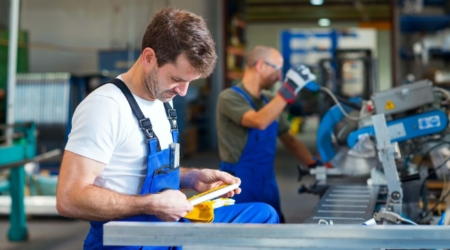In 1986 the first four wheeled petrol car drove the streets of Birmingham. This was very much an indicator of what was to come for the Midlands, as this one car was soon followed by the largest concentration of motor manufactures anywhere in the UK, or in Europe for that matter, delivering vast wealth, employment opportunities and the greatest engineering and manufacturing minds to the Midlands.
In December 1996, there were 575,000 people directly employed in manufacturing or engineering jobs, with many more people’s livelihoods directly or indirectly connected to these areas. However, by December 2010, less than 15 years later, this number stood at less than 285,000, representing a drop of over 50%; recessions and company closures were to blame, as well as the cost of labour in the UK compared to overseas, and the ease of global transport.
From 1997 to 2010, the Midlands experienced the largest percentage fall of manufacturing output anywhere in the UK, from £15.3 billion to £11.8 billion, showing that the declines of the industry seen within the previous decade were continuing.
Now, however, both public and private bodies are actively working to reverse these historical trends and make the Midlands a hub of manufacturing and engineering again. The Midlands’ automotive industry, which boasts many globally recognised brands such as Jaguar Land Rover, MG Rover and Aston Martin are already claiming that they are feeling the effects of the revival and are keen to encourage it. Making the Midlands a key engineering and manufacturing hub again is a long-term multifaceted project, but relies on several fundamental elements to ensure its success.
Manufacturing and Engineering Education
The Midlands is home to some of the UK’s top universities, including the University of Birmingham, and the University of Warwick, as well as many other fine institutions like Coventry and Aston Universities. All of these academic institutions have excellent engineering departments, which are being encouraged to work increasingly closely with established firms throughout the region. Increasing numbers of engineering and manufacturing courses are offering one year work placements, allowing students to gain practical experience alongside their degree, as well as allowing them to make connections with firms in the local area, which then become more likely to offer these students permanent positions upon completion of their degree.
Not only does this mean the Midlands are producing top level professionals in these areas, but it means that these candidates are being retained in the Midlands, allowing their skills and experience to assist local companies, rather than working on engineering projects elsewhere.
Manufacturing and engineering education is not limited to Universities in the Midlands though; over 1,100 academies have been created in the local area within the last five years, which has resulted in more than a quarter of a million children receiving an education in a good or outstanding institution than in 2010. Schools are focusing now more than ever on the importance of STEM subjects (Science, Technology, Engineering and Mathematics), which will teach children key skills and encourage them to progress their education within these areas, leading them to manufacturing and engineering jobs.
Government Investment
It’s not just private firms that have recognised the trends in manufacturing and engineering in the Midlands, but the government has recognised this too, and has acted accordingly. In March 2015, the government decided to undertake a huge new engineering project, focusing on Energy Research Accelerators, dedicating the project £60 million and locating it within the Midlands. This is in addition to Birmingham’s new Energy Catapult Centre, and plans to create special enterprise zones throughout the Midlands, allowing engineering and manufacturing companies the best facilities and government support to help them grow.
Significant financial investment has also been put into long term infrastructure plans, especially with respect to transport, which are essential for firms’ development and growth. The government has planned to invest £5.2 billion into making the Midlands a transport hub for the entire country, which will have a positive multiplier effect on the established firms within the area, as well as encouraging more firms to move to the Midlands. This investment will take the form of, amongst other things, upgrading key roads such as the M6 and M1, electrifying the mainline railway between London St Pancras and Sheffield, as well as building new train stations at important sites such as Kenilworth.
Local Support and Encouragement
The success or otherwise of these industries will be felt most on a grassroots level; it will affect the ordinary families of the Midlands the most. As such, they have the most to gain from the success of these businesses. Encouraging STEM subjects in their own children, working together with councils and MPs to secure favourable legislation for these firms, as well as actively engaging with the manufacturing and engineering companies in their local area, have all been widely praised and cited examples of how local Midlands people are helping to bring about change. While many of them may not remember the great contribution the manufacturing industry in this area had during World War Two, or the growth of well paid jobs in the 1950s, their elderly relatives are likely to do so. Returning the Midlands to its roots as a manufacturing and engineering hub will not only benefit the region massively now, but will also honour its past.
At Subcon Laser, we are a family business who is actively attempting to encourage this transition in the Midlands. By offering high-quality and affordable laser cutting services, we are proud to be a part of the Midlands’ manufacturing and engineering hub. For more information about what we do, or to get a quote, please contact us.









